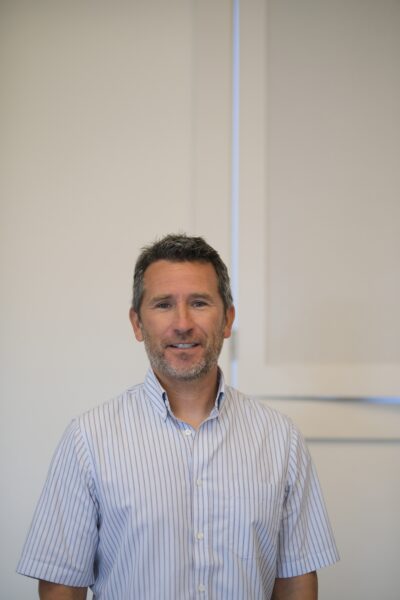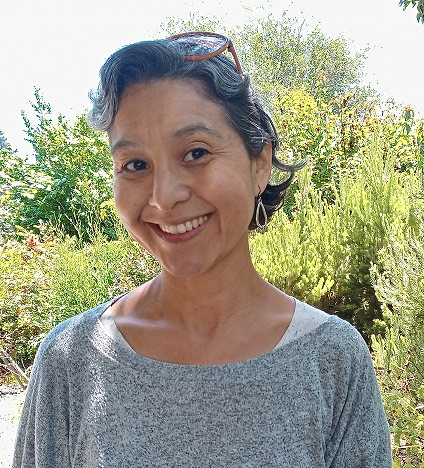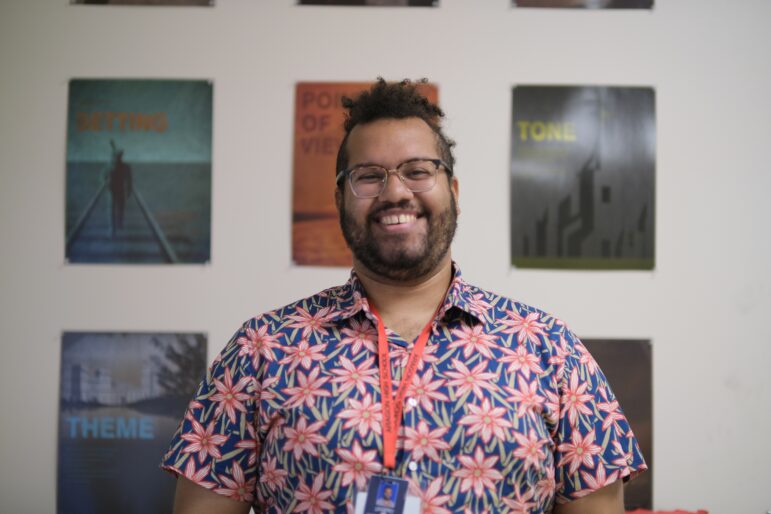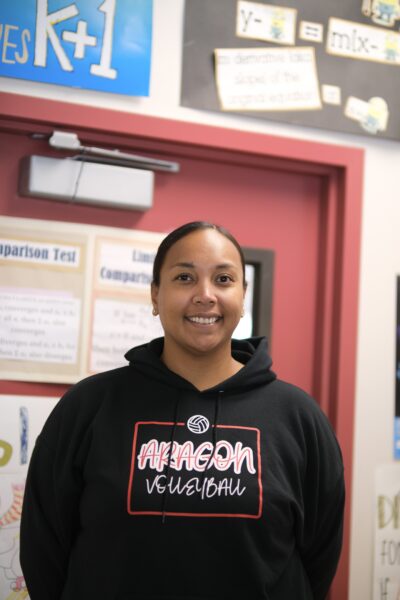Andrew Silva, kinesiology

When did your passion for kinesiology start?
I really became interested in kinesiology as I was starting my career as a water polo and swim coach. I wanted to learn more about what factors make athletes perform at their best. Concepts like sport and exercise psychology, motor learning and control and exercise physiology are all part of the kinesiology discipline and directly impact athletic performance. While studying kinesiology in graduate school, I developed a strong passion for teaching this subject, which has stayed with me throughout my academic career.
Who is your role model and why?
I had a specific professor when I was at Cal Poly, where I went [for] graduate school. Her name is Dr. Camille O’Bryant. She was the head of the kinesiology department and she gave me my first teaching job after I finished graduate school. She is not only one of the smartest people I’ve ever met, but she’s incredibly compassionate and understanding of all students’ needs. She has taught me so much about the value of getting to know your students and showing interest in the goals that your students have.
Do you have advice for your students?
I believe very strongly in taking great pride in all your work and responsibilities, whether it’s an academic class, a sports team or a school club [because it] is what’s going to always lead you to success.
What are some of your hobbies?
I enjoy stand-up paddleboarding. It’s an activity that [not only] helps keep me physically active, but also allows me to relax and enjoy being on the water. It’s a challenge to maintain balance and takes some energy to participate in, [but I] find it calming to be on the water. I enjoy traveling. I’ve been so fortunate to have traveled to over 15 countries as part of the USA Water Polo national team staff. Australia and New Zealand had beautiful coastlines and great weather. Hungary and Serbia were very exciting to visit because water polo is a major sport there, and professional players are treated like celebrities. I really enjoyed my opportunity to see and stay in Kuwait City in the country of Kuwait because the culture and customs are very different [than that of] America.
Marisa Castillo, dance

What was the most memorable moment in your teaching career?
Last year, I was student-teaching at a high school in San Francisco. At the end of the year, the students were showing their final performance and [it was memorable] to just see how much the students had grown in that year, how they found themselves through the expression of dance. It just shows the power of what dance education can do for someone. I also love to see how people transform after discovering they can dance. They discover a different facet of themselves. I think that there is a sense of empowerment.
Do you have any advice you would give your students?
Always practice believing in yourself. Just have a strong sense of belief in what you’re doing and in the journey that your life is taking [you]. Because that inner fire is going to carry you when the world falls apart or when people who [you] thought you can count on can’t [be there for you]. It has to be within you to persevere and [move] forward. Especially in the realm of the arts, you have to have that strong sense of self-belief that I’m going to do this. [In] the arts … you get more nos than yeses. It’s just one of those areas where it tests your [belief] in yourself.
Who is your role model and why?
My mom because she’s a highly educated woman who raised four kids on her own. She has a doctor’s degree. I’m in awe of her, of what she’s able to do. My husband because he’s also an educator. He’s been teaching high school for [more than] 15 years. He just got hired at Mills [as] a new art teacher. His relationship with students inspired me to have that same connection with my students. My mentor teacher, Justin Moore, who taught me how to stay present in the moment of teaching … There’s always a lesson planned out but sometimes to stay with the students, you have to stay present [and] really appreciate what your students bring into the classroom.
What are some of your goals for the school year?
The goal is to build the dance program. I want to get to know the other dance teachers in the district. I would like to incorporate cultural dances into the dance show, and just share how dance is this subject that connects to all subjects. You can explore dance and science, dance and math, dance and art, dance and cooking, dance and literature.
Gary Mitchell, English

Why did you decide to become an English teacher at Aragon?
I thought it was one of the classes that gives you so much freedom to discuss philosophy, critical thinking, different worlds, different perspectives that other classes don’t offer in the same capacity, because the English instruction is guided by the text you teach. There are millions of different texts to choose from. [There are] different wealths of knowledge that can be expanded upon.
Why did you choose to come to Aragon and the San Mateo Union High School District?
I was born and raised in Georgia and when I moved here, it was one of the first times I ever felt safe in school. While I loved my time in Georgia, the schools there unfortunately [were violent] … [There was] a lot of gang violence … Teachers were underpaid and underprepared. When I started going to Hillsdale, I finally felt like I was in a safe space, and all the teachers there were really impactful to me. That’s why I immediately jumped on the opportunity to teach here at Aragon.
Who is your role model and why?
Oh, my dad. Absolutely. My dad is one of the hardest working men I’ve ever known in my life. We were very poor growing up. I remember there were times my dad had three jobs and I wouldn’t see him because I would wake up and go to bed and he’d already be at work or coming home at two in the morning. He taught me everything I know about being a man. Still to this day, he teaches me things even as I’m rapidly approaching 30 and he’s approaching 60. He [has] so much wisdom to impart on me. I also got to see him grow as a human over time. In my youth, he was very traditionally masculine; ‘Don’t cry, pull yourself up, don’t show weakness.’ As he’s grown and I’ve grown, he’s become more in touch with his emotions and more in tune with a quiet, peaceful form of masculinity, and I try to emulate that as well.
What are your goals for the school year?
[I want to] try my best to give my students an education that isn’t the education of a first-year teacher … I want them to have the full wealth of knowledge to go into their senior and junior years feeling prepared and ready to crush it.
Do you have advice for your students?
You can’t predict everything that will happen to you, but you can choose how you react to it. [There are] … so many things [in] this world are out of our control, and people are very often dwelling on these things. My advice would be to focus on things that are actually in your control and work on those.
Kristie Hala’ufia, math, instructional aide

Can you tell me a little bit about yourself?
I was born and raised in San Mateo. I went to Aragon. [I played sports], went to school and had some great teachers. I played basketball in Southern California, then came back and decided to coach. While I was coaching, I was hired to be an instructional aide and after that, for eight years, I decided to finally get into teaching.
Why did you decide you wanted to become a math teacher?
While I was in high school, I had a lot of good math teachers. I wasn’t great at math, but a lot of my teachers created a safe environment for me to learn. There was a lot of support with math, so I wanted to do the same [by] coming back to teach.
What was the most memorable moment in your teaching career?
The coolest moment was when my fellow colleagues found out that I was going to be teaching. They were very excited for me, so knowing that I have a lot of support from everyone is pretty awesome. At the first staffulty meeting when my colleagues found out I was going to teach this semester, I did not expect the amount of applause and cheers because it has been a long time coming for me to finally take this next step in my career. It made me feel supported and loved.
Do you have advice you would give your students?
I live by a saying that goes “Do everything with your whole heart,” meaning that if you want to do something, put your whole effort into it. My parents always taught me to put forth a full-hearted effort into anything I do, whether that is building relationships with others, [focusing] on my game when I played or working hard in school. My parents came to America from the island of Tonga and [they] had to work hard for everything that they have [now], so they have taught me to do the same in anything that I am doing. Even to this day as I coach and teach, they still tell me to put my whole heart into everything I do.




